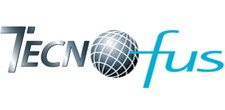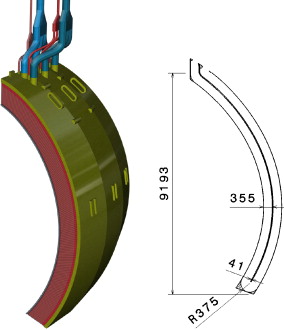TECNO FUS: Difference between revisions
(→Tasks) |
No edit summary |
||
| (31 intermediate revisions by one other user not shown) | |||
| Line 1: | Line 1: | ||
[[File:Tecnofus a.jpg|thumb|420px|left]] | [[File:Tecnofus a.jpg|thumb|420px|left]] | ||
== Introduction == | |||
Generally speaking the purpose of the breeding blanket is twofold: to extract the energy generated in the power reactor, and to convert Lithium into Tritium. Going into the details of these key component of the Fusion reactor the breeding blanket has to guarantee: | TECNO_FUS is a Programme financed by the Spanish Government (by means of a CONSOLIDER INGENIO 2010 grant CSD2008-0079 by [http://www.micinn.es/ MICINN around 2,5 M€ and actually on new Department of Economy and Competitiveness (MINECO)]. It is oriented towards the development of technologies associated with the [[Breeding blanket]] key component of future Fusion Power Plants. | ||
Generally speaking the purpose of the breeding blanket is twofold: to extract the energy generated in the power reactor, and to convert Lithium into Tritium. Going into the details of these key component of the Fusion reactor the breeding blanket has to guarantee mainly but not only those objectives, already the following purposes: | |||
* The shielding of superconducting coils from the plasma (n, γ) radiation with extreme shield factors (< mW cm<sup>-3</sup>) | * The shielding of superconducting coils from the plasma (n, γ) radiation with extreme shield factors (< mW cm<sup>-3</sup>) | ||
| Line 26: | Line 28: | ||
* [http://www.itma.es/ Instituto Tecnológico de Materiales (ITMA) ] (Centro Tecnológico del Acero y Materiales Metálicos at Avilés) together with the [http://www.uniovi.es/ Universidad de Oviedo (UNIOVI)] | * [http://www.itma.es/ Instituto Tecnológico de Materiales (ITMA) ] (Centro Tecnológico del Acero y Materiales Metálicos at Avilés) together with the [http://www.uniovi.es/ Universidad de Oviedo (UNIOVI)] | ||
* [http://www.ucm.es/ Universidad Complutense de Madrid (UCM)] | * [http://www.ucm.es/ Universidad Complutense de Madrid (UCM)] | ||
* [http://www.uned.es/Universidad Nacional de Educación a Distancia (UNED)] | * [http://www.uned.es/ Universidad Nacional de Educación a Distancia (UNED)] | ||
* [http://www.upc.es/ Universidad Politécnica de Cataluña (UPC)] | * [http://www.upc.es/ Universidad Politécnica de Cataluña (UPC)] | ||
* [http://www.upm.es/ Universidad Politécnica de Madrid (UPM)] | * [http://www.upm.es/ Universidad Politécnica de Madrid (UPM)] | ||
| Line 37: | Line 39: | ||
Leadership researchers are responsible for the following 9 tasks: | Leadership researchers are responsible for the following 9 tasks: | ||
# Computational neutronics of Modular Dualcoolant -DRM-refrigerated by He and by LiPb | # Computational neutronics of Modular Dualcoolant -DRM-refrigerated by He and by LiPb, | ||
# Integral structural design Thermomecanic (TM) and EM of the DRM He/ | # Integral structural design Thermomecanic (TM) and EM of the Modular Dualcoolant DRM He/LiPb, | ||
# Integral CDF computational capabilities for Liquid Metal and gas channels of the DRM He/LiPb box and its auxiliary systems, | # Integral CDF computational capabilities for Liquid Metal and gas channels of the DRM He/LiPb box and its auxiliary systems, | ||
# Production of DRM functional and structural materials, | # Production of DRM functional and structural materials, | ||
| Line 47: | Line 49: | ||
# Blanket and Systems Integration and engineering survey | # Blanket and Systems Integration and engineering survey | ||
In each task may be more than one | In each task may be more than one Working Group. | ||
== Groups == | == Groups == | ||
| Line 53: | Line 55: | ||
Experts Leadership researchers are responsible for the following 19 groups: | Experts Leadership researchers are responsible for the following 19 groups: | ||
# WG 1: Computational neutronics of Modular Dual coolant -DRM-refrigerated by He and by LiPb box; | # WG 1: Computational neutronics of Modular Dual coolant -DRM-refrigerated by He and by LiPb box]]<ref>[http://dl.dropbox.com/u/7419832/FusionWiki/Abstract_ISFNT10.pdf I. Palermo, J.M. Gómez-Ros, G. Veredas, J. Sanz, L. Sedano, ''Neutronic Design Analysis for a Dual-Coolant Blanket concept: Optimization for a Fusion Reactor DEMO'' (ISFNT-10: International Symposium on Fusion Nuclear Technology, Portland, Oregon, USA, 11-16 September 2011) sent to Fusion Eng. Des. (2012)] | ||
</ref><ref>[http://www.sciencedirect.com/science/article/pii/S0920379611003036 J.P. Catalán, F. Ogandoa, J. Sanz, I. Palermo, G. eredas, J.M. Gómez-Ros, L. Sedano, ''Neutronic analysis of a dual He/LiPb coolant breeding blanket for DEMO'', Fusion Engineering and Design '''86''' (2011) 2293–2296]</ref>; | |||
# WP 2: Responsible for the Integral structural design by Thermal Mechanics and Electromagnetic structural design, within task 2; | # WP 2: Responsible for the Integral structural design by Thermal Mechanics and Electromagnetic structural design, within task 2; | ||
# WG 3: CDF computational capabilities for Liquid Metal and gas channels of the DRM He/LiPb box and its auxiliary systems, (Thermal Hydraulics), within the subtask 3.1; | # WG 3: CDF computational capabilities for Liquid Metal and gas channels of the DRM He/LiPb box and its auxiliary systems, (Thermal Hydraulics), within the subtask 3.1<ref>[http://www.sciencedirect.com/science/article/pii/S0022311511001930 J. Fradera, L. Sedano, E. Mas de les Valls, L. Batet, ''Implementation of two-phase tritium models for helium bubbles in HCLL breeding blanket modules'', Journal of Nuclear Materials '''417''' (2011) 739–742] | ||
# WG 4: Integral CDF computational capabilities for Liquid Metal and gas channels of the DRM He/LiPb box and its auxiliary systems, (Magneto Hydrodynamics, subtask 3.2) | </ref>; | ||
# WG5: Production of Eurofer steels batches at laboratory, within task 4.1 (Actually strong added value of ASTURFER ® made mainly but not only with ITMA resources; | # WG 4: Integral CDF computational capabilities for Liquid Metal and gas channels of the DRM He/LiPb box and its auxiliary systems, (Magneto Hydrodynamics, subtask 3.2)<ref>[http://www.sciencedirect.com/science/article/pii/S0920379611003449 E. Mas de les Valls, L. Batet, V. de Medina, J. Fradera, L.A. Sedano, ''Qualification of MHD effects in dual-coolant DEMO blanket and approaches to their modelling'', Fusion Engineering and Design '''86''' (2011) 2326–2329] | ||
# WG6: Production of | </ref>; | ||
# WG7: Production of SiC subtask 4.3; the objective of this task is the production routes of ceramic materials based on porous SiC and composite SiCf/SiC, for application as insulating channel inserts (or insulating FCI). This is based on the Modular Dual coolant He/LiPb or TECNO-FUS DRM Liquid Metal. The SiC has been choice due its excellent thermal stability, mechanical and chemical characteristics at high temperatures. Its low thermal expansion, good thermal shock resistance, low corrosion in Pb-15.7Li, low activation and good resistance to neutron irradiation make it the correct working material. | # WG5: Production of Eurofer steels batches at laboratory, within task 4.1 (Actually strong added value of ASTURFER ® made mainly but not only with ITMA resources.This experimental RAFM steel grade was obtained in a melting Pilot Plant by means of a High Vacuum induction melting furnace in order to assure a good control and to avoid possible [[impurities]]. The data obtained in the process of microstructural characterization (hardness or grain size), as in the mechanical tests put into practice at different temperatures as tensile test, facture test as well as the evaluation of a preliminary welding study, show a similar behavior to EUROFER 97-2. | ||
. <ref>[http://www.reunionanualsne.es/sites/default/files/doc37/ponencias/983377-778336.pdf A.Morán, J. Belzunce, J.M. Artímez, ''Producción y cualificación, para aplicaciones de Fusión, de un acero de baja actividad ferrítico-martensítico'', ASTURFER®] | |||
</ref>; | |||
# WG6: Production of <sup>6</sup>Li and eutectic LiPb batches at laboratory, within subtask 4.2 (Actually added value of 15 batches of LiPb fused and refused in different conditions made at UCM and impurities analysed with the ICP-MS of CIEMAT)<ref> [[doi::10.1016/j.fusengdes.2010.11.028|A.I.Barrado, M.Fernández, E.Conde, A.Quejido, J.Quiñones, L.Sedano, ''Preliminary studies of in-cell electrophoresis as <sup>6</sup>Li enrichment technique'', 26<sup>th</sup> Symposium on Fusion Technology, Fusion Engineering and Design, Volume '''86''', Issued 14 Jan 2011, Pages 2662-2665]]</ref><ref>[http://dl.dropbox.com/u/7419832/FusionWiki/UCM%20Informe%20del%20Proyecto%20Tecno-fus.pdf M.I.Barrena, J.M.Gómez de salazar, Alicia Soria, Laura Pascual, Informe del Proyecto CONSOLIDER INGENIO 2010 TECNO-FUS]</ref>]; | |||
# WG7: Production of SiC subtask 4.3; the objective of this task is the production routes of ceramic materials based on porous SiC and composite SiCf/SiC, for application as insulating channel inserts (or insulating FCI). This is based on the Modular Dual coolant He/LiPb or TECNO-FUS DRM Liquid Metal. The SiC has been choice due its excellent thermal stability, mechanical and chemical characteristics at high temperatures. Its low thermal expansion, good thermal shock resistance, low corrosion in Pb-15.7Li, low activation and good resistance to neutron irradiation make it the correct working material.<ref>[http://www.sciencedirect.com/science/article/pii/S0920379611003644 Ainhoa Bereciartu, Nerea Ordás, Carmen García-Rosales, Alejandro Moroño, Marta Malo, Eric R. Hodgson, Jordi Abellà, Luis Sedano, ''Manufacturing and characterization of porous SiC for flow channel inserts in dual-coolant blanket designs'', Fusion Engineering and Design '''86''' (2011) 2526–2529]</ref><ref> [http://www.ceit.es/index.php?option=com_content&view=article&id=91&Itemid=206 TECNO_FUS Project in CEIT website]</ref>; | |||
# WG8: Metallurgical characterisation of the Eurofer steels batches at laboratory, (subtask 4.1. Actually characterisation of the ASTURFER ® batches); | # WG8: Metallurgical characterisation of the Eurofer steels batches at laboratory, (subtask 4.1. Actually characterisation of the ASTURFER ® batches); | ||
# WG9: Electrical Properties characterisation of the Modular dual coolant DRM He/LiPb functional and structural materials, mainly but not only SiC coming from subtask 4.3) within subtask 4.5; | # WG9: Electrical Properties characterisation of the Modular dual coolant DRM He/LiPb functional and structural materials, mainly but not only SiC coming from subtask 4.3) within subtask 4.5; | ||
# WG10: Tritium properties characterisation by means of the selected technologies by EHU-UPV, mainly but not only IDE, within | # WG10: Tritium properties characterisation by means of the selected technologies by EHU-UPV, mainly but not only IDE, within subtask 4.6<ref> [http://www.reunionanualsne.es/sites/default/files/doc37/sinopsis/11-10%20_205_.pdf G. Alberro, I. Peñalva, J. Aranburu,F. Legarda, C. Moreno, L. Sedano, ''TOWARDS STANDARDISATION OF TRITIUM DIFFUSION AND SOLUBILITY MEASUREMENTS IN FUSION REACTOR MATERIALS'']</ref>; | ||
# WG11: Computational characterisation of eutectic LiPb, within subtask 4.7; | # WG11: Computational characterisation of eutectic LiPb, within subtask 4.7; | ||
# WG12: Devoted to the design of tritium transport analysis and corresponding FPD, within subtask 5.1; | # WG12: Devoted to the design of tritium transport analysis and corresponding FPD, within subtask 5.1 <ref>[http://www.sciencedirect.com/science/article/pii/S0920379611002250 P. Martínez, N. Moral, L. Magielsen, A. Fedorov, C. Moreno, J.M. Perlado, L. Sedano, ''LIBRETTO-4: Understanding and modeling tritium transport under irradiation'', Fusion Engineering and Design '''86''' (2011) 2374–2377] </ref><ref>[http://upcommons.upc.edu/pfc/handle/2099.1/ ''Modelat del transport de triti en un canal de l'embolcall regenerador de triti d'un reactor de fusió DT,'' PFC Pau Bermúdez García. Dec-2010]</ref>; | ||
# WG13: The aim of this Group is the Control and monitoring technologies within subtask 5.2 oriented to specific tritium monitoring an control developments: 1. Development of H-partial pressure sensors, 2. Li-title electrochemical sensor and Li-title on-line adjustment techniques, and 3. Composition evolution sensing). | # WG13: The aim of this Group is the Control and monitoring technologies within subtask 5.2 oriented to specific tritium monitoring an control developments: 1. Development of H-partial pressure sensors, 2. Li-title electrochemical sensor and Li-title on-line adjustment techniques, and 3. Composition evolution sensing)<ref>[http://www.sciencedirect.com/science/article/pii/S092037961100041X P. Serret, S. Colominas, G. Reyes, J. Abellà, ''Characterization of ceramic materials for electrochemical hydrogen sensors'', Fusion Engineering and Design '''86''' (2011) 2446–2449]</ref><ref> [http://www.reunionanualsne.es/sites/default/files/doc37/ponencias/983377-334445.pdf L. Llivina, S. Colominas, J. Abellà, ''Síntesis y caracterización de cerámicas para sensores de hidrógeno'']</ref>; | ||
# WG14: Design of technologies and Plant Systems, which purpose are the Power Conversion (helium cycles and CO2 cycles) and the new energy vectors for Fusion, within subtask 5.3; | # WG14: Design of technologies and Plant Systems, which purpose are the Power Conversion (helium cycles and CO2 cycles) and the new energy vectors for Fusion, within subtask 5.3<ref>[[doi::10.1016/j.fusengdes.2011.02.010| | ||
J.I.Linares, L.E.Herranz, B.Y.Moratilla, I.P.Serrano, ''Power conversion systems based on Brayton cycles for fusion reactors'', 26<sup>th</sup> Symposium on Fusion Technology, Fusion Engineering and Design '''86''' (2011) 2735–2738]] </ref><ref> [http://dl.dropbox.com/u/7419832/FusionWiki/Linares_JEPE.pdf J.I. Linares, L.E. Herranz, B.Y. Moratilla, I.P. Serrano, ''Brayton Power Cycles For Electricity Generation From Fusion Reactors'', Jan. 2010, Volume '''4''', No.1 (Serial No.26) Journal of Energy and Power Engineering, ISSN 1934-8975, USA]</ref>; | |||
# WG15: Breeding blanket diagnostics and Control and Data Acquisition (CODAC) architectures; | # WG15: Breeding blanket diagnostics and Control and Data Acquisition (CODAC) architectures; | ||
# WG16: Safety analysis of the DRM He/LiPb system (subtask 7.1); | # WG16: Safety analysis of the DRM He/LiPb system (subtask 7.1); | ||
# WG17: Group responsible for the development of the Environmental Impact of the of fusion power plant systems mainly but not only in the atmosphere, running some numerical weather prediction model coupled with some dispersion model to analyse tritium species concentration in air and associated doses, within the subtask 7.2; | # WG17: Group responsible for the development of the Environmental Impact of the of fusion power plant systems mainly but not only in the atmosphere, running some numerical weather prediction model coupled with some dispersion model to analyse tritium species concentration in air and associated doses, within the subtask 7.2<ref>[http://www.reunionanualsne.es/sites/default/files/doc37/ponencias/983377-886491.pdf P. Castro, M. Velarde, J. Ardao, J. M. Perlado, L. Sedano, ''Tritiated Clouds Enviromental Impact in Air into the Western Mediterranean Basin Evaluation''] | ||
</ref><ref> [http://www.new.ans.org/pubs/journals/fst/a_12665 P. Castro, M. Velarde, J. Ardao, J. M. Perlado, L. Sedano, ''Consequences of Different Meteorological Scenarios in the Environmental Impact Assessment of Tritium Release'', Fusion Science and Technology '''60''', 4 (2011) 1284-1287]</ref><ref>[http://ieeexplore.ieee.org/xpl/freeabs_all.jsp?arnumber=6052268 Castro, P., Velarde, M., Ardao, J., Perlado, J.M., Sedano, L., ''Differences into HT and HTO concentrations in air into the Western Mediterranean Basin and Continental Europe and safety related issues'', Fusion Engineering (SOFE), 2011 IEEE/NPSS 24<sup>th</sup> Symposium on Issue Date: 26-30 June 2011 ] </ref> ; | |||
# WG18: DEMO plasmae and reactor specifications as Task 8. | # WG18: DEMO plasmae and reactor specifications as Task 8. | ||
# WG19: Group Responsible for complete task 9 with the purpose of the Blanket and Systems Integration and engineering survey (mainly but not only the RAFM). | # WG19: Group Responsible for complete task 9 with the purpose of the Blanket and Systems Integration and engineering survey (mainly but not only the RAFM). | ||
[[File:Libretto41_42.png|420 px|thumb|Evolution of the Tritium transferece rate in a first cycle september 2005 of HRF Petten(P.Martínez,CIEMAT N.Moral et al. UPM) <ref>[http://www.sciencedirect.com/science/article/pii/S0920379611002250 P. Martínez, N. Moral, L. Magielsen, A. Fedorov, C. Moreno, J.M. Perlado, L. Sedano, LIBRETTO-4: Understanding and modeling tritium transport under irradiation | [[File:Libretto41_42.png|420 px|thumb|right|Evolution of the Tritium transferece rate in a first cycle september 2005 of HRF Petten(P.Martínez,CIEMAT N.Moral et al. UPM) <ref>[http://www.sciencedirect.com/science/article/pii/S0920379611002250 P. Martínez, N. Moral, L. Magielsen, A. Fedorov, C. Moreno, J.M. Perlado, L. Sedano, ''LIBRETTO-4: Understanding and modeling tritium transport under irradiation'', Fusion Engineering and Design '''86''' (2011) 2374–2377] </ref>]] | ||
== External links == | == External links == | ||
# [http://www.reunionanualsne.es/sites/default/files/doc37/sinopsis/11-01%20_190_.pdf J. Sánchez, L. A. Sedano, E. R. Hodgson, M. Victoria, J. Sanz, M. Chiumenti,J. Hernández, F. Reventós, R. Codina, A. Ibarra, J. Belzunce, J. Quiñones, C.Gª Rosales, P.Fernández, A. Moroño, F. Legarda, J. M. Perlado, J. Sempere, J.Abellà, J. I. Linares, J. Vega, L.E. Herranz, J. Mª. Martínez-Val, E. Mínguez,, J. Dies, J.Alonso(and 90 researches from 13 Institutions,)PROGRESS IN TECNO_FUS PROGRAMME FOR DUALCOOLANT ADVANCED BREEDING BLANKET DEVELOPMENTS] | |||
# [http://www.upm.es/observatorio/vi/actividad.jsp?id_actividad=66623 L.Sedano, TECNO_FUS: A Breeding Blanket NFT programme developing dual functional He/Pb15.7Li systems engineering & associated underlying technologies] | |||
# [http://www-fusion.ciemat.es/LMBW/detailed_programme03.shtml International Workshop on Liquid Metal Breeder Blankets. 23-24 September 2010, CIEMAT, Madrid] | |||
# [http://www.tecnofus.net TECNO_FUS website] | |||
# [http://www.tecnofus-doculib.net TECNO_FUS DOCULIB website for the WG Members] | |||
== References == | == References == | ||
<references /> | <references /> | ||
Latest revision as of 16:51, 21 October 2014
Introduction
TECNO_FUS is a Programme financed by the Spanish Government (by means of a CONSOLIDER INGENIO 2010 grant CSD2008-0079 by MICINN around 2,5 M€ and actually on new Department of Economy and Competitiveness (MINECO). It is oriented towards the development of technologies associated with the Breeding blanket key component of future Fusion Power Plants.
Generally speaking the purpose of the breeding blanket is twofold: to extract the energy generated in the power reactor, and to convert Lithium into Tritium. Going into the details of these key component of the Fusion reactor the breeding blanket has to guarantee mainly but not only those objectives, already the following purposes:
- The shielding of superconducting coils from the plasma (n, γ) radiation with extreme shield factors (< mW cm-3)
- The extraction and amplification of the fusion power (thermal loads in the first wall MWm-2 and volumetric (MWm-3)
- Tritium self-sufficientcy, i.e. technology of closed tritium cycle as an intrinsic requirement of the DT fusion reactors.
Associated techniques involve neutron detection, the development of materials (Eurofer steel, ceramics, SiC or composite SiCf/SiC), the management of liquid metals in strong magnetic fields, and thermomechanical calculations in complex geometries. The first design of a dual coolant, dual functionality model is not original of TECNO_FUS, what is original is the development of the so called dual coolant Lithium Lead (DCLL) or Modular Double Coolant DRM He/Liquid Metal design (Spanish for "Doble Refrigerante Modular" of He/Pb-15.7Li.
Going into details it is worthwhile to mention some ongoing tasks:
- ITMA has started the development of a spanish RAFM ASTURFER ® and CIEMAT is making its metallurgical characterisation.
- CEIT has started the development of production routes of ceramic materials based on porous SiC and composite SiCf/SiC, for application as insulating channels inserts (FCI= Flow Channel Inserts). This is based on the concept of regenerative DRM/LiPb. The SiC is the Material of choice for its application due to its excellent thermal stability, mechanical and chemical characteristics at high temperatures. Its low thermal expansion, good thermal shock resistnce, low corrosion in Pb-15.7Li, low activation and good resistance to neutron irradiation make it the correct working material.
Institutional participation
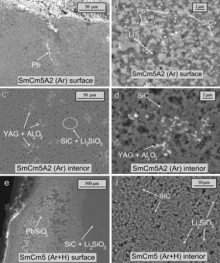
Institutions involved are specialized Centres and Universities all over Spain, they are the following:
- Centro de Estudios e Investigaciones Técnicas de Gipuzkoa (CEIT) of the Universidad de Navarra (UNAV)
- Universidad Pontificia de Comillas (ETSII-COMILLAS)
- Universidad del País Vasco (UPV-EHU)
- Instituto Químico de Sarriá -IQS-(Universidad Ramón Llull)
- Instituto Tecnológico de Materiales (ITMA) (Centro Tecnológico del Acero y Materiales Metálicos at Avilés) together with the Universidad de Oviedo (UNIOVI)
- Universidad Complutense de Madrid (UCM)
- Universidad Nacional de Educación a Distancia (UNED)
- Universidad Politécnica de Cataluña (UPC)
- Universidad Politécnica de Madrid (UPM)
The work is coordinated by CIEMAT, acting as Legal Management Entity, such that the Head of the National Fusion Laboratory LNF is also the Research Coordinator. The project includes a Technical Secretary with specific support an a CAD Office.
Tasks
Leadership researchers are responsible for the following 9 tasks:
- Computational neutronics of Modular Dualcoolant -DRM-refrigerated by He and by LiPb,
- Integral structural design Thermomecanic (TM) and EM of the Modular Dualcoolant DRM He/LiPb,
- Integral CDF computational capabilities for Liquid Metal and gas channels of the DRM He/LiPb box and its auxiliary systems,
- Production of DRM functional and structural materials,
- Design of technologies and Plant Systems,
- Breeding blanket diagnostic and control and Data Acquisition (CODAC) architectures,
- Safety analysis and the Environmental Impact of the DRM He/LiPb system,
- DEMO plasmae and reactor specifications and
- Blanket and Systems Integration and engineering survey
In each task may be more than one Working Group.
Groups
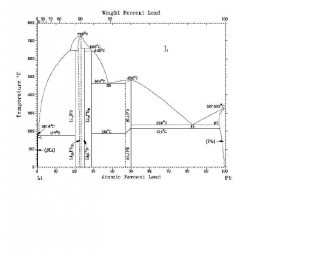
Experts Leadership researchers are responsible for the following 19 groups:
- WG 1: Computational neutronics of Modular Dual coolant -DRM-refrigerated by He and by LiPb box]][3][4];
- WP 2: Responsible for the Integral structural design by Thermal Mechanics and Electromagnetic structural design, within task 2;
- WG 3: CDF computational capabilities for Liquid Metal and gas channels of the DRM He/LiPb box and its auxiliary systems, (Thermal Hydraulics), within the subtask 3.1[5];
- WG 4: Integral CDF computational capabilities for Liquid Metal and gas channels of the DRM He/LiPb box and its auxiliary systems, (Magneto Hydrodynamics, subtask 3.2)[6];
- WG5: Production of Eurofer steels batches at laboratory, within task 4.1 (Actually strong added value of ASTURFER ® made mainly but not only with ITMA resources.This experimental RAFM steel grade was obtained in a melting Pilot Plant by means of a High Vacuum induction melting furnace in order to assure a good control and to avoid possible impurities. The data obtained in the process of microstructural characterization (hardness or grain size), as in the mechanical tests put into practice at different temperatures as tensile test, facture test as well as the evaluation of a preliminary welding study, show a similar behavior to EUROFER 97-2.
. [7];
- WG6: Production of 6Li and eutectic LiPb batches at laboratory, within subtask 4.2 (Actually added value of 15 batches of LiPb fused and refused in different conditions made at UCM and impurities analysed with the ICP-MS of CIEMAT)[8][9]];
- WG7: Production of SiC subtask 4.3; the objective of this task is the production routes of ceramic materials based on porous SiC and composite SiCf/SiC, for application as insulating channel inserts (or insulating FCI). This is based on the Modular Dual coolant He/LiPb or TECNO-FUS DRM Liquid Metal. The SiC has been choice due its excellent thermal stability, mechanical and chemical characteristics at high temperatures. Its low thermal expansion, good thermal shock resistance, low corrosion in Pb-15.7Li, low activation and good resistance to neutron irradiation make it the correct working material.[10][11];
- WG8: Metallurgical characterisation of the Eurofer steels batches at laboratory, (subtask 4.1. Actually characterisation of the ASTURFER ® batches);
- WG9: Electrical Properties characterisation of the Modular dual coolant DRM He/LiPb functional and structural materials, mainly but not only SiC coming from subtask 4.3) within subtask 4.5;
- WG10: Tritium properties characterisation by means of the selected technologies by EHU-UPV, mainly but not only IDE, within subtask 4.6[12];
- WG11: Computational characterisation of eutectic LiPb, within subtask 4.7;
- WG12: Devoted to the design of tritium transport analysis and corresponding FPD, within subtask 5.1 [13][14];
- WG13: The aim of this Group is the Control and monitoring technologies within subtask 5.2 oriented to specific tritium monitoring an control developments: 1. Development of H-partial pressure sensors, 2. Li-title electrochemical sensor and Li-title on-line adjustment techniques, and 3. Composition evolution sensing)[15][16];
- WG14: Design of technologies and Plant Systems, which purpose are the Power Conversion (helium cycles and CO2 cycles) and the new energy vectors for Fusion, within subtask 5.3[17][18];
- WG15: Breeding blanket diagnostics and Control and Data Acquisition (CODAC) architectures;
- WG16: Safety analysis of the DRM He/LiPb system (subtask 7.1);
- WG17: Group responsible for the development of the Environmental Impact of the of fusion power plant systems mainly but not only in the atmosphere, running some numerical weather prediction model coupled with some dispersion model to analyse tritium species concentration in air and associated doses, within the subtask 7.2[19][20][21] ;
- WG18: DEMO plasmae and reactor specifications as Task 8.
- WG19: Group Responsible for complete task 9 with the purpose of the Blanket and Systems Integration and engineering survey (mainly but not only the RAFM).
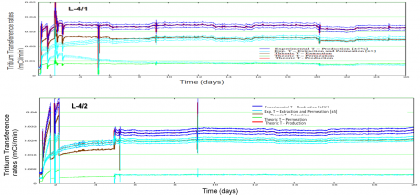
External links
- J. Sánchez, L. A. Sedano, E. R. Hodgson, M. Victoria, J. Sanz, M. Chiumenti,J. Hernández, F. Reventós, R. Codina, A. Ibarra, J. Belzunce, J. Quiñones, C.Gª Rosales, P.Fernández, A. Moroño, F. Legarda, J. M. Perlado, J. Sempere, J.Abellà, J. I. Linares, J. Vega, L.E. Herranz, J. Mª. Martínez-Val, E. Mínguez,, J. Dies, J.Alonso(and 90 researches from 13 Institutions,)PROGRESS IN TECNO_FUS PROGRAMME FOR DUALCOOLANT ADVANCED BREEDING BLANKET DEVELOPMENTS
- L.Sedano, TECNO_FUS: A Breeding Blanket NFT programme developing dual functional He/Pb15.7Li systems engineering & associated underlying technologies
- International Workshop on Liquid Metal Breeder Blankets. 23-24 September 2010, CIEMAT, Madrid
- TECNO_FUS website
- TECNO_FUS DOCULIB website for the WG Members
References
- ↑ Ainhoa Bereciartu, Nerea Ordás, Carmen García-Rosales, Alejandro Moroño, Marta Malo, Eric R. Hodgson, Jordi Abellà, Luis Sedano, Manufacturing and characterization of porous SiC for flow channel inserts in dual-coolant blanket designs, Fusion Engineering and Design 86 (2011) 2526–2529
- ↑ M.I.Barrena, J.M.Gómez de salazar, Alicia Soria, Laura Pascual, Informe del Proyecto CONSOLIDER INGENIO 2010 TECNO-FUS
- ↑ I. Palermo, J.M. Gómez-Ros, G. Veredas, J. Sanz, L. Sedano, Neutronic Design Analysis for a Dual-Coolant Blanket concept: Optimization for a Fusion Reactor DEMO (ISFNT-10: International Symposium on Fusion Nuclear Technology, Portland, Oregon, USA, 11-16 September 2011) sent to Fusion Eng. Des. (2012)
- ↑ J.P. Catalán, F. Ogandoa, J. Sanz, I. Palermo, G. eredas, J.M. Gómez-Ros, L. Sedano, Neutronic analysis of a dual He/LiPb coolant breeding blanket for DEMO, Fusion Engineering and Design 86 (2011) 2293–2296
- ↑ J. Fradera, L. Sedano, E. Mas de les Valls, L. Batet, Implementation of two-phase tritium models for helium bubbles in HCLL breeding blanket modules, Journal of Nuclear Materials 417 (2011) 739–742
- ↑ E. Mas de les Valls, L. Batet, V. de Medina, J. Fradera, L.A. Sedano, Qualification of MHD effects in dual-coolant DEMO blanket and approaches to their modelling, Fusion Engineering and Design 86 (2011) 2326–2329
- ↑ A.Morán, J. Belzunce, J.M. Artímez, Producción y cualificación, para aplicaciones de Fusión, de un acero de baja actividad ferrítico-martensítico, ASTURFER®
- ↑ A.I.Barrado, M.Fernández, E.Conde, A.Quejido, J.Quiñones, L.Sedano, Preliminary studies of in-cell electrophoresis as 6Li enrichment technique, 26th Symposium on Fusion Technology, Fusion Engineering and Design, Volume 86, Issued 14 Jan 2011, Pages 2662-2665
- ↑ M.I.Barrena, J.M.Gómez de salazar, Alicia Soria, Laura Pascual, Informe del Proyecto CONSOLIDER INGENIO 2010 TECNO-FUS
- ↑ Ainhoa Bereciartu, Nerea Ordás, Carmen García-Rosales, Alejandro Moroño, Marta Malo, Eric R. Hodgson, Jordi Abellà, Luis Sedano, Manufacturing and characterization of porous SiC for flow channel inserts in dual-coolant blanket designs, Fusion Engineering and Design 86 (2011) 2526–2529
- ↑ TECNO_FUS Project in CEIT website
- ↑ G. Alberro, I. Peñalva, J. Aranburu,F. Legarda, C. Moreno, L. Sedano, TOWARDS STANDARDISATION OF TRITIUM DIFFUSION AND SOLUBILITY MEASUREMENTS IN FUSION REACTOR MATERIALS
- ↑ P. Martínez, N. Moral, L. Magielsen, A. Fedorov, C. Moreno, J.M. Perlado, L. Sedano, LIBRETTO-4: Understanding and modeling tritium transport under irradiation, Fusion Engineering and Design 86 (2011) 2374–2377
- ↑ Modelat del transport de triti en un canal de l'embolcall regenerador de triti d'un reactor de fusió DT, PFC Pau Bermúdez García. Dec-2010
- ↑ P. Serret, S. Colominas, G. Reyes, J. Abellà, Characterization of ceramic materials for electrochemical hydrogen sensors, Fusion Engineering and Design 86 (2011) 2446–2449
- ↑ L. Llivina, S. Colominas, J. Abellà, Síntesis y caracterización de cerámicas para sensores de hidrógeno
- ↑ J.I.Linares, L.E.Herranz, B.Y.Moratilla, I.P.Serrano, Power conversion systems based on Brayton cycles for fusion reactors, 26th Symposium on Fusion Technology, Fusion Engineering and Design 86 (2011) 2735–2738
- ↑ J.I. Linares, L.E. Herranz, B.Y. Moratilla, I.P. Serrano, Brayton Power Cycles For Electricity Generation From Fusion Reactors, Jan. 2010, Volume 4, No.1 (Serial No.26) Journal of Energy and Power Engineering, ISSN 1934-8975, USA
- ↑ P. Castro, M. Velarde, J. Ardao, J. M. Perlado, L. Sedano, Tritiated Clouds Enviromental Impact in Air into the Western Mediterranean Basin Evaluation
- ↑ P. Castro, M. Velarde, J. Ardao, J. M. Perlado, L. Sedano, Consequences of Different Meteorological Scenarios in the Environmental Impact Assessment of Tritium Release, Fusion Science and Technology 60, 4 (2011) 1284-1287
- ↑ Castro, P., Velarde, M., Ardao, J., Perlado, J.M., Sedano, L., Differences into HT and HTO concentrations in air into the Western Mediterranean Basin and Continental Europe and safety related issues, Fusion Engineering (SOFE), 2011 IEEE/NPSS 24th Symposium on Issue Date: 26-30 June 2011
- ↑ P. Martínez, N. Moral, L. Magielsen, A. Fedorov, C. Moreno, J.M. Perlado, L. Sedano, LIBRETTO-4: Understanding and modeling tritium transport under irradiation, Fusion Engineering and Design 86 (2011) 2374–2377
